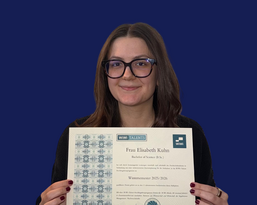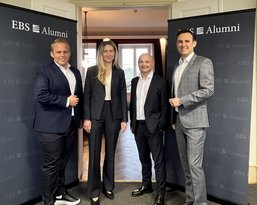
Leadership in the digital transformation
What is the most efficient way for managers to bring their company into the digital age? Prof. Tobias Gutmann answers the most important questions about digital transformation in a short interview.

EBS: What are the most critical aspects that modern leaders need to consider in digital transformation?
Tobias Gutmann: The most critical aspects that modern leaders need to consider in digital transformation are flexibility, a willingness to innovate and a deep understanding of the impact of technology on the business. Creating a culture that supports change and fosters an environment where employees are willing to learn and use new technologies is also essential.
EBS: What are "old" (leadership) premises that have to be thrown overboard in order to be part of that transformation and not feel overwhelmed?
Tobias Gutmann: One of the key "old" leadership premises that need to be jettisoned in order to be part of the transformation process is the belief that experience and hierarchy automatically qualify as leadership qualities. In the digital world, other skills such as creativity, agility and adaptability are crucial. It is important to build a team with different skills and backgrounds to be successful.
EBS: How do you cope with the fact that the younger generation can be much more expert in digital transformation than seasoned leaders?
Tobias Gutmann: To deal with the fact that the younger generation can be much more expert in digital transformation than experienced leaders, it is important to create a climate of collaboration and learning. Leaders should be open to learning from younger members of staff and, if necessary, also involve them in decision-making processes. It is also important to create a culture that encourages sharing knowledge and skills between generations.
EBS: Top 3 tips on how to involve and engage the entire organisation, including the CEO and secretary, in the process.
Tobias Gutmann: My top 3 tips for involving and engaging the entire organisation in the process are (1) communicating a clear vision and strategy that all employees can understand and support, (2) organising training to ensure that all employees have the skills they require to succeed, and (3) providing incentives and rewards to encourage participation and, ultimately, success.
EBS: Thesis: What will the working world look like in 2033, i.e. 10 years from now?
Tobias Gutmann: In my opinion, the world of work in 2033 will be greatly influenced by technology and automation. Artificial intelligence and automation will take over many tasks that are currently done by humans.
Prof. Dr. Tobias Gutmann is Assistant Professor of Product Innovation. He teaches in the bachelor's and master's degree program in technology and innovation management as well as strategy consulting with a focus on emerging technologies, innovation management systems, processes, theories and governance as well as structured problem solving. He also leads the EBS Onboarding Project, a specialty in the first two weeks of our Bachelor's degree in Business Administration, which gives students the opportunity to work with practitioners from companies on a large diverse case study. This includes many impulse lectures, interactive workshops, company presentations and visits as well as specialist lectures by EBS professors.







